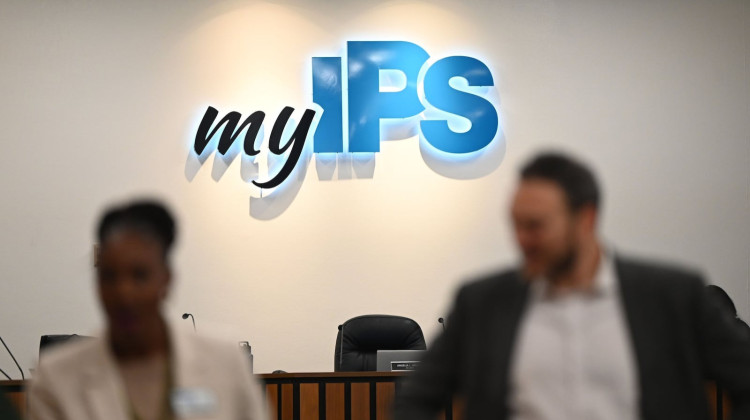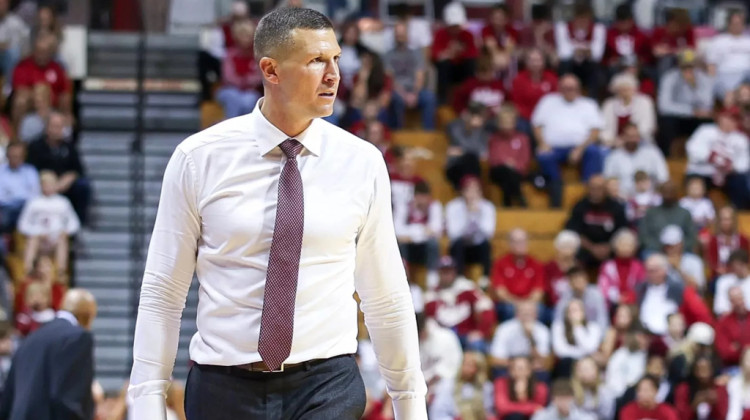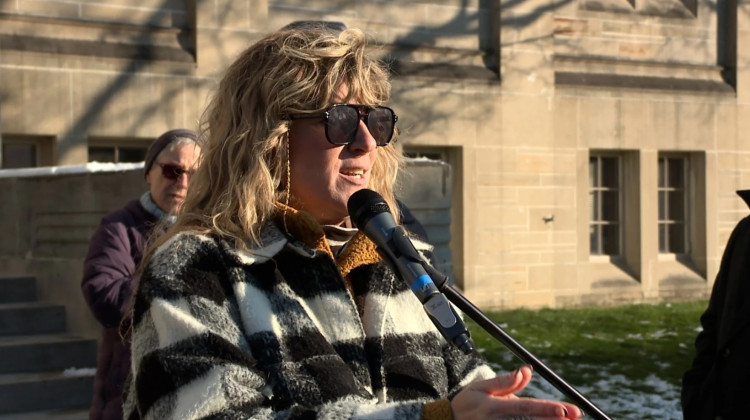Scott McGuire is a senior social work major at the University of Indianapolis, and when he looks back on his first few years of college, he sees chaos.
"I would forget a lot about my stuff I had to do, and people would get on me about not showing up to meetings, people would get on me about not getting my work done," McGuire says.
McGuire is balancing school and his social work practicum this semester. Busy for any college student.
But he’s also dyslexic.
Dyslexia is a learning disability most people associate with mixed up words and numbers, but that’s simplifying it. His mind works differently.
It can be like letting papers pile up on a desk. A solution might be to develop a filing system, but the method everyone else is using doesn’t work for the dyslexic mind. It needs its own filing system or the papers keep stacking up.
In high school, McGuire had his own filing system to deal with his dyslexia — in school, at home. But college is a different beast. Time management and organization are things students have to figure out on their own. And for McGuire, this posed a real challenge.
"I feel like those first two years or whatever, I had to learn how to be independent," he says. "I really, really struggled with that."
Enter the Life Coach
On a recent Friday afternoon, McGuire met with his life coach, Megan Lauman, on the UIndy campus.
The two have been meeting for nine months — ever since a grant from the Nina Mason Pulliam Charitable Trust made it possible for Indianapolis non-profit Tangram to expand its life-coaching service through a pilot program at UIndy.
It’s designed for people like McGuire — with so-called hidden disabilities like autism or dyslexia. You can’t see them, but they can create social and academic obstacles. So Tangram’s goal is to help people like McGuire figure out ways to create ways to overcome them.
"One of Scott’s was organization," Lauman says. "So, Scott and I really worked this summer to develop a system that he could just start this school year up and running, ready to go so he wasn’t having to piecemeal it together."
They developed time-management strategies and other ways to stay organized that were tailor-made for him. McGuire used to make hand-written to-do list and promptly lose them. Lauman suggested using electronic notes or the calendar on his phone.
"It’s made me a lot more organized in a lot of ways," McGuire says. "It moved me into the twenty-first century. Just use a lot more technology in your life to keep things straight and simple."
"You Have to Create Life Then"
Students like McGuire are often at a disadvantage after high school. By law, K-12 schools must provide support for learning-disabled students. But that mandate doesn’t apply to colleges — academic support for the learning disabled may exist, but students usually have to seek it out themselves.
Many do not.
Steve Odore is the director of Tangram Life Coaching. He designed the program four years ago after noticing a pattern in young adults with disabilities — lower graduations rates at the high school level and especially at the college level.
“All the way through high school, life kind of happens to you, right," Odore says. "In college, all of a sudden it’s 'Here you are', you get dropped off. You have to create life then. And that’s one of the biggest transitions people have and you put at-risk kids on top of that and it becomes a much more difficult process."
Statistics reinforce Odore’s point. According to report based on data from the National Longitudinal Transition study, only 29 percent of students with disabilities enrolled in a postsecondary program after high school actually finish within four years. The numbers are lower for learning-disabled students whom enroll in two and four-year programs.
McGuire does receive academic supports through UIndy’s BUILD program, which is designed for learning-disabled students. But those supports don’t necessarily extend to life outside of school. Odore says that’s where the life coaching program comes in, helping establish structure and accountability outside of the classroom so that the client can succeed inside the classroom.
"Just imagine the difference between feeling in control of what your tomorrow looks like and what your expectations are, as opposed to everybody coming to you every week and saying 'Did you do that? Why didn’t you do that,'" Odore says. "Well now that I’m using an electronic organizing system, and I know when something is due. It makes you feel like a lot more of an adult than being reprimanded for not handing it in."
McGuire says the weekly meetings with Lauman have all been worth it. Developing the strategies, putting them into action and gauging the results — he says it’s put him in a place he couldn’t have imagined a year ago.
"I felt prepared academically, but I didn’t feel as prepared life-wise," McGuire says. "Now that she’s [Lauman] come along I feel like a lot more prepared in my outside life."
McGuire says it has enabled him to look beyond college, to the future.
"I have confidence now that be independent and get a good job and live a good life because of this program."
You can more about the Tangram Life Coaching Program by clicking here.
 DONATE
DONATE






 View More Articles
View More Articles



 Support WFYI. We can't do it without you.
Support WFYI. We can't do it without you.